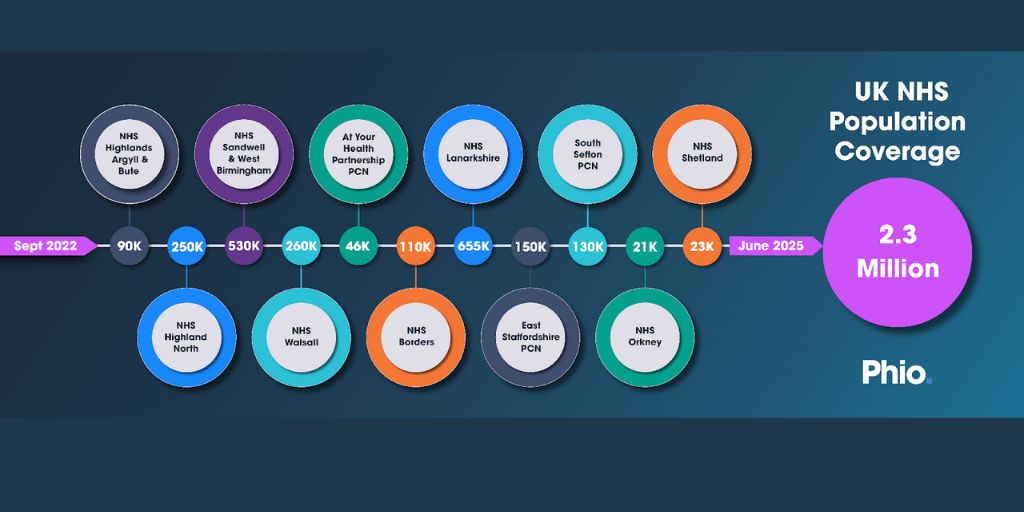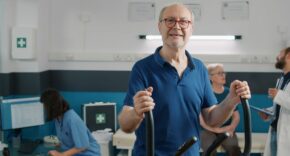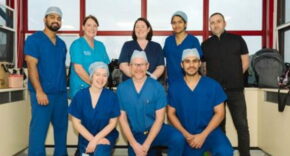
London, 16th June 2025 – Eleven NHS organisations – including three Primary Care Networks (PCNs) – have now gone live with, or signed contracts to deploy Phio, a musculoskeletal (MSK) triage and rehabilitation technology, giving an estimated 2.3 million registered patients the option to start physio care instantly on their phone instead of waiting for a GP appointment.
The drive comes as the adult MSK waiting list in England hit 342,593 referrals in July 2024, the largest single community backlog. The Chartered Society of Physiotherapy explains the NHS would need 12,000 additional physiotherapists to fulfill the demand.
Where the Phio physiotherapy service is working now:
- East Staffordshire PCN – 150,000 catchment population
- South Sefton PCN – 130,000 catchment population
- At Your Health Partnership PCN – 46,000 catchment population1
- NHS Lanarkshire – 655,000 catchment population
- Sandwell & West Birmingham NHS Trust – 530,000 catchment population
- NHS North Highland – 250,000 catchment population
- Walsall Healthcare NHS Trust – 260,000 catchment population
- NHS Borders – 110,000 catchment population
- NHS Highland Argyll & Bute – 90,000 catchment population
- NHS Shetland – 23,000 catchment population
- NHS Orkney – 21,000 catchment population
Early results in NHS organisations
At Sandwell & West Birmingham NHS Trust, waiting times fell by eight weeks and more than 1,200 clinical hours were reallocated to complex cases. In NHS Highland, digital triage is saving around £134,000 in GP time and £29,000 in physiotherapy appointments each year, while 75 % of assessed patients manage their condition independently.
Sarah Laing, Executive Lead at East Staffordshire PCN, says: “We have adopted an exciting new physiotherapy service, Phio, to alleviate the huge pressure on our GPs and provide better access to physiotherapy for all our adult patients in our catchment area. We integrated the technology quickly in only a few weeks, and our service is already seeing early benefits. With increasing strains and economic pressures across the UK, it’s imperative we integrate AI and technology solutions as quickly as we can, especially at a primary care network level.”
How the technology Phio works
Phio Access is a conversational computational assessment that asks the patient adaptive questions drawn from a decision-tree library covering 3,000-plus MSK scenarios. In less than five minutes it signposts users to the most appropriate care pathway, for example, those needing urgent care, those requiring a physiotherapy appointment, or those who can and wish to manage their condition remotely.
Phio Engage is the companion smartphone app that delivers evidence-based exercise programmes; 24/7 access to clinicians via a messaging interface and a dashboard that tracks progress and pain scores, so that clinicians can step in if the recovery stalls.
Mick Thacker, Professor of Pain and Head of R&D at EQL, says: “We simply cannot train 12,000 extra physios overnight. Faced with a national MSK pain pandemic, we have to widen the front door to care and make the best use of AI and technology. MSK pain is a societal issue, negatively impacting both the individual, their carers and loved ones, as well as employment and social well-being.
“Digital triage backed by good analytics and personalised care is the only realistic way to keep Britain’s population healthy while protecting human face-to-face services for the people who need them most. Digital approaches naturally support effective self-management, empowering the person to take control of their own condition.”
Real stories from NHS patients using Phio
Ravi, 40, is a self-employed carpenter whose torn shoulder tendon left him unable to lift tools or work. Within hours of contacting his GP, he was onboarded to Phio with clear instructions on how to use the app immediately. With Phio, Ravi was able to complete his physiotherapy at times that suited him, fitting sessions around his work and family commitments.
Linda, 70, is a retired nurse who suffered a knee ligament injury after a fall during a netball game. Within an hour she enrolled on the app, and was able to start her exercises right away, despite significant pain. Over time, her condition steadily improved, and she eventually regained the ability to walk pain-free.
Dr Craig Gillespie, GP Trainer and Clinical Director at South Sefton Primary Care Network, says: “Adopting physiotherapy technology Phio is a significant step forward in treating common issues like back and neck pain, which affect huge numbers of people. Patients value the convenience and quality of care Phio provides. This kind of technology is exactly what we need to enhance physiotherapy services.”
The scale of the problem
- 19.5 million working days were lost to MSK sickness in 2022 – one eight-hour shift every 1.6 seconds. Calculated from ONS’s record 185.6 million total sick-days, of which 10.5 % were MSK-related.
- Back and neck pain alone drain £1.4 billion a year from the welfare budget and sideline almost a million working-age adults.
- NHS operational update marks 342,593 patients waiting for physiotherapy as of July 2024 – the largest single community backlog in England.
Paul Massam, Finance & Transformation Manager at South Sefton Primary Care Network, says: “We’re expanding the use of Phio across the South Sefton area to ensure everyone who needs physiotherapy can access care quickly. The real-time data available through the Phio dashboard helps us identify where services are most needed, enabling us to deliver physiotherapy care more equitably. Implementing Phio in our PCN community was easy and quick; the Phio team provided high quality demonstrations to our clinical and non clinical staff to support this.”











